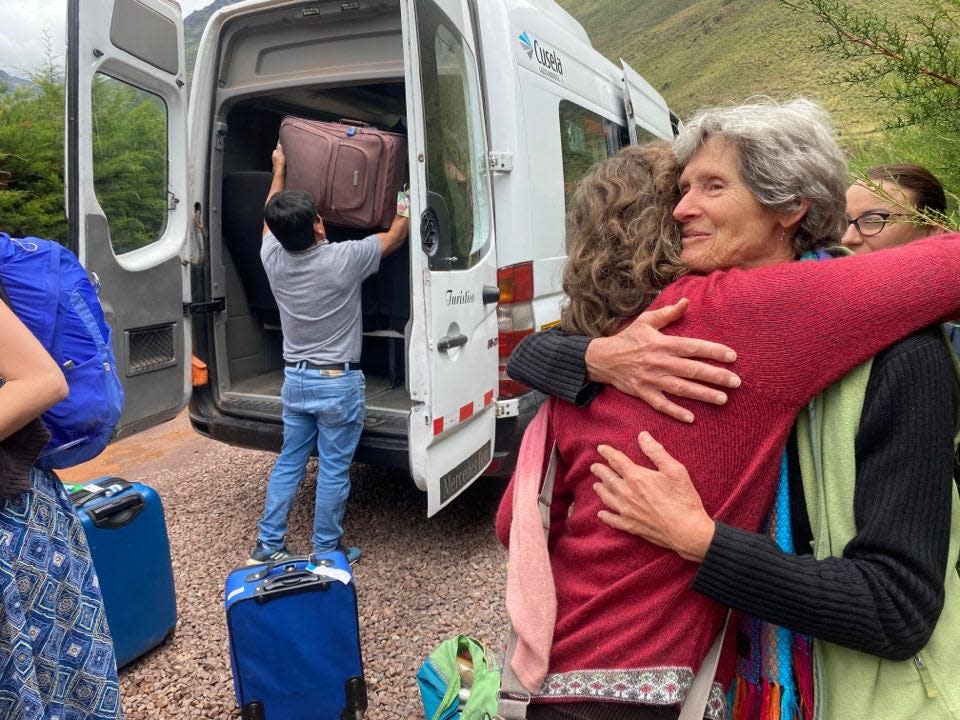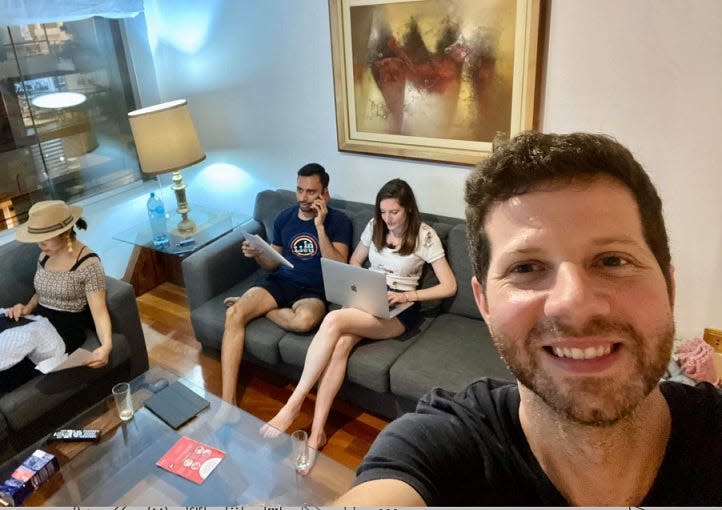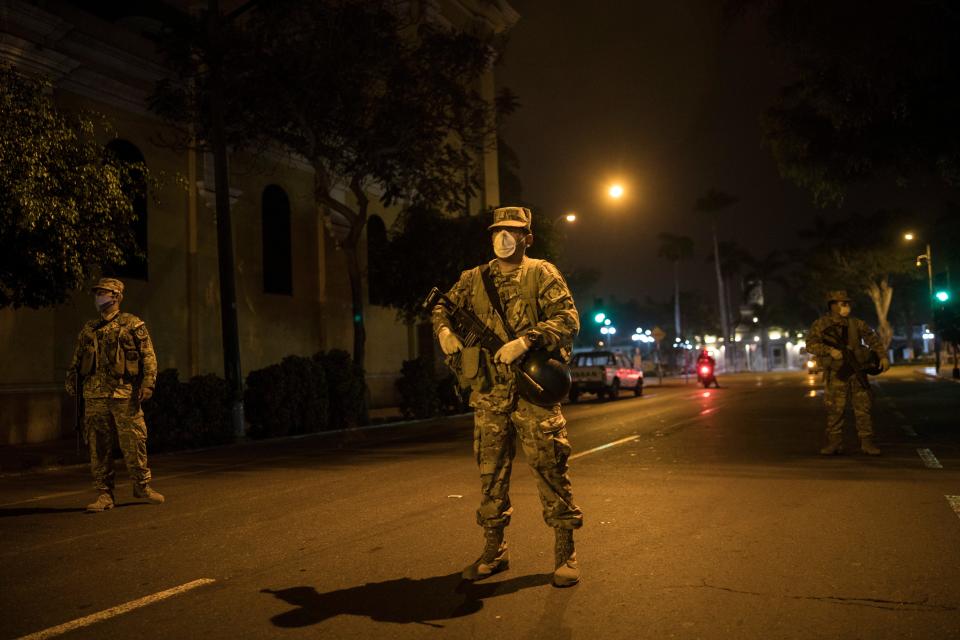U.S. Embassy working with Peru to charter flights for Americans stranded amid pandemic
The United States Embassy in Lima said Monday it is “working in close coordination with the Peruvian Government to explore charter repatriation flights” for hundreds of Americans stranded amid the coronavirus pandemic.
It's a situation that has become frustrating for not only the stranded Americans, but also for the government of Peru. The nation's defense minister said over the weekend that Saturday is the last day the government will support the return of foreigners from the country before declaring the border "closed permanently" because of the coronavirus situation.
Defense Minister Walter Martos said in a previous interview with Canal N that President Martín Vizcarra, who had initially closed the borders March 15, had ordered all airports and borders closed completely as of Sunday and will take a "much stricter measure," El Comercio reported Saturday.
As of Monday afternoon, the U.S. Embassy said that approximately 600 Americans had already left Peru on expatriation flights. The Embassy did warn Americans against scams and added that Peru was “limiting air traffic to repatriation travel for U.S. citizens facilitated through the U.S. government.”
Israel brought in planes on Thursday to take out hundreds of its citizens and Canada was repatriating many of its citizens Saturday.
'I can't help but feel we are abandoned': Stranded Americans seek US help amid global lockdown
Jared Anderson, a 37-year-old New Yorker who flew to Peru on March 10 to visit his girlfriend, is one of the Americans stuck behind closed borders and under a 15-day quarantine. He said the U.S. Embassy has told them they are essentially on their own.

Anderson spoke to USA TODAY on Friday, only hours after Israeli planes brought out its citizens.
Anderson said it is almost impossible to reach anyone on a U.S. Embassy phone in Lima and when he has, the embassy says "we are pretty much told this was the situation and you've got to figure it out."
On Monday, Anderson updated USA TODAY via text message and said he still hasn't had luck in getting out of Peru.
"Overall feel that the Peruvian government has done a good job of managing things for the most part and feel the issue around repatriation squarely falls on the U.S. government," Anderson wrote. "We have also been told that we are expected to sign a promissory note that we will repay the government if they repatriate us and it could be $1,500 one way. This is definitely higher than everyone's return airfare that we had booked with the airlines.
"Many can't afford this and wonder how the government could be asking so much money especially as they are bailing out the airlines in the US and there are many aircraft sitting idle."
In Monday's release, the U.S. Embassy asked that Americans interested in repatriation flights email their information to the Embassy, so that it could work on adding those interested to flight manifests.
In the release, the Embassy said the flights would not be free, but that the passengers would not be asked to pay costs up front.
After an outcry from individuals and members of Congress, Secretary of State Mike Pompeo said Friday that the department is using "all of the tools we can" to bring Americans home, including a mix of commercial and private flights. He said the agency is also discussing with the Pentagon the possibility of employing military aircraft.
He said State Department has put together a "repatriation task force," which is working on reports from individual citizens and members of Congress, and is urging stranded travelers to log in to the Smart Traveler Enrollment Program.
"We'll track you and try to get everybody back," Pompeo said.

The U.S. military’s Southern Command said Friday that it was flying 89 U.S. citizens from Honduras to Charleston, South Carolina, after they were unable to return home because of the virus outbreak in the second Air Force Mission to bring people from Honduras, the Associated Press reported.
Anderson is in Lima, but said many of the Americans are scattered around the country particularly near the popular tourist destination of Machu Picchu and jungle cities of Iquitos and Pucallpa.
Stranded in Peru: These Tennesseans are among the hundreds of Americans who didn't make it out before the country was locked down
The personal and tourist trips were disrupted when the Peruvian president closed the border on March 15 and issued a strict, 15-day, stay-indoors quarantine – for the entire country.

Pauline Saade, from Cliffside, New Jersey, tells USA TODAY that she and 12 other "self-isolating" Americans and Canadians are stuck in the town of Pisac in south-central Peru, where they have been since Feb. 24.
Saade, 38, said that the Canadians were contacted by their embassy on Friday and were getting picked up Saturday to take them to Cusco to get a flight home.
She said the U.S. Embassy had come up short in their efforts to get out.
"There’s lack of consistent information, lack of resources to get us out from point A to point B, lack of leadership, lack of seamless communications between countries and most important compassion to do what’s right to get us home to our families so we can get through this difficult time in our homes surrounded by our loved ones," she said.
Saade also said she had spent hours online and on the phone trying to rebook her flight or talk to a carrier representative.
She added that those stranded there were having to pay up to $100 a night "in order for us to safely stay here."
"I understand our leaders are doing what they can to contain the virus and protect people with compromised immune systems," Saade said. "I just wish the communication between countries like Peru and U.S. were more organized and efficient so the process of getting people out to there families can be achieved."
Anderson said the Americans in his group are confined to a hotel, following a rigorous 8 p.m. to 5 a.m. curfew. He said only one person from a family is allowed to go for groceries and must buy them and return directly.
The group has even started a Facebook page called Americans Stuck in Peru.
He said the group includes a pregnant woman, elderly people and one person with Lyme disease.
Anderson said on Monday that there "are many scams going on" with companies posting to the Facebook page, claiming they can get the stranded travelers home but asking for funds – sometimes thousands of dollars – to be wired to them.
Sen. Ron Wyden, Democrat of Oregon, has been pressing the State Department for help in repatriating three Oregonians stranded in Peru.
"He has been told a task force is working to extract all Americans overseas, and he remains determined to make sure this task force translates into action that gives all Americans trying to leave Peru, and any and all other countries, clear guidance and urgently needed assistance to bring them home," a spokesman for Wyden said on Saturday.
Travel restrictions: Trump announces U.S.-Mexico border closure to stem spread of coronavirus
Jason Gramling, from Milwaukee, said on the Facebook page that he is stuck there with his wife and two daughters, ages 6 and 10.
"Please, we need to get out of here and get back home," he wrote. "We have a place to stay but very soon will be running out of money and food and I won't know what we will be able to do.please I don't want to die here."
"My children are scared because there will be nothing to eat soon," he wrote.
"What we don't know is what is happening," Anderson said. "The good news is that the grocery stores have food, but the medical care system is very different than the American standard and a little bit scary."
"A lot of us are in good spirits and definitely ready to come home and be with family," he said.
Americans who are not in Lima or Cusco but are interested in repatriation flights are being asked to shelter in place and follow quarantine measures until receiving flight information and transportation details from the Embassy.
Contributing: Associated Press
This article originally appeared on USA TODAY: Coronavirus: U.S. Embassy working to repatriate Americans stranded in Peru

